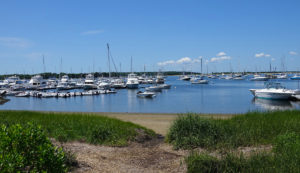 HYANNIS – The short-term rental tax bill passed this week by the Massachusetts Legislature will help to fund water quality improvement projects on Cape Cod and the Islands.
HYANNIS – The short-term rental tax bill passed this week by the Massachusetts Legislature will help to fund water quality improvement projects on Cape Cod and the Islands.
The bill, which extends the 5.7 percent hotel tax to short-term rentals through online services like AirBnB and allows municipalities to collect up to an additional 9 percent, created the Cape Cod and Islands Water Protection Fund.
The fund will be supported by a 2.75 percent excise tax on all Cape and Islands rentals.
The entire Cape and Islands legislative delegation worked to include the fund into the bill. The effort was spearheaded by Cape and Islands State Senator Julian Cyr (D-Truro) and 4th Barnstable State Representative Sarah Peake (D-Provincetown) spearheaded the effort.
“We worked together with the Cape Cod Chamber, with the business community and other stakeholders to find a way to help lift some of the burden off the backs of local property owners on Cape Cod,” Peake said.
As part of a lawsuit in 2011 filed by the Conservation Law Foundation, towns on Cape Cod are legally mandated to develop and build wastewater systems to clean up nitrogen pollution.
The estimated price tag for cleanup efforts and future maintenance on the Cape and Islands is $4 billion.
The fund will provide assistance for critical municipal or regional water pollution abatement projects.
“This will probably provide about a $1 billion worth of tax relief over the course of time as communities are wrestling with how to meet the demands of the 208 plan,” Peake said. “It is money raised on Cape Cod and the Islands for Cape Cod and the Islands wastewater projects.”
Cyr said the legislation is basically a property tax saving bill for local residents.
“We are asking the people who visit and who love Cape Cod and the Islands to help pay for and help be part of the solution for our significant wastewater needs,” Cyr said.
The creation of the fund is an essential step to the state’s $1 billion commitment to the Cape and Islands $4 billion wastewater problem, according to Cyr.
“We have to do it from an environmental perspective. We have to do it from an economic perspective,” Cyr said. “The product that we have to sell on the global market place is our marine environment and our fresh water. There are tens of thousands of folks crammed onto Cape Cod and Islands right now for our water so if we don’t keep that clean it really erodes the product that we have to sell.”
The 2.75 percent excise tax will be across all rental platforms, including hotels, condominiums, homes or cottages.
There is a provision in the bill that allows communities to opt out by a two-thirds vote at Town Meeting or by a two-thirds vote by Town Council. Communities that opt out would then tax residents.
The trust fund will be administered under the State Treasurer’s Office similar to way the existing state revolving fund is administered.
An advisory board made up of representatives from each participating town, the Cape Cod Commission and the Martha’s Vineyard Commission.
Cyr said although estimates have been calculated on the conservative end about how much will be contributed into the fund each year, it will be a sizeable chunk of money.
In 2018, AirBnB has brought in about $300 million in revenue from Cape and Islands rentals alone, which would generate $8 million.























